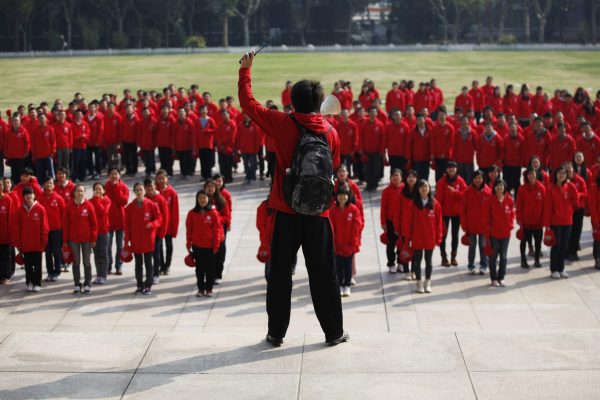It’s tempting to view the Chinese Communist Party’s (CCP) latest ‘patriotic struggle’ as a similarly banal attempt to insert more patriotic language into intellectual discourse, merely requiring scholars to ladle on an extra helping or two of the latest platitudes and clunky propaganda to make the grade. But that would miss an important point. While the campaign might look familiar, China’s current intellectual climate renders it far more potent than may first appear.
Titled ‘The Offensive to Promote the Spirit of Patriotic Struggle, Contribute Positively to Building the Enterprise in the New Era’, the text lays down broad requirements for intellectuals to increase their ‘patriotic’ attitude. This includes training sessions and expeditions, study of Xi Jinping Thought and a propaganda drive to produce new articles, books and literary works.
On the face of it, this is not exactly new. Patriotic education campaigns in various forms are as old as the People’s Republic of China, and the CCP has long understood the role of what it calls ‘thought work’ in political change. There were periodic campaigns throughout the 1980s even as Deng Xiaoping moved to de-radicalise the political climate, but it was in the aftermath of 4 June 1989 that the importance of patriotic education truly came into focus. That year, the CCP confronted a profound crisis of legitimacy as it faced what its leadership saw as existential threats both at home and abroad.
In his first speech after the Tiananmen crackdown, Deng identified the Party’s ‘biggest mistake’ as the neglect of ‘ideological and political education’. What followed was a ‘patriotic education’ campaign intended to reach all citizens. The people needed to be continually reminded of the Party’s role at the centre of the nation’s great historical struggle, and as the only force capable of ending China’s ‘century of humiliation’ and realising its rejuvenation.
Most significantly, the CCP redefined what it meant by ‘patriotism’ — to equate love of the country with love of the Party.
But as China’s economy reignited following Deng’s fabled ‘Southern Tour’ and the country’s accession to the WTO, the Party’s sense of crisis diminished, and with it the urgency of these campaigns. During the Hu–Wen years, patriotic education initiatives were still rolled out, but absent the same sense of a looming, terminal threat.
That is, until the ascension of Xi Jinping in late 2012.
The new General Secretary made clear that the time for complacency was over. The Party, under his leadership, would no longer take its legitimacy for granted. Lax organisational discipline, anaemic ideological control and all fomenting sources of discontent were to be confronted — corruption and environmental degradation chief among them. Particular attention was to be given to the ‘ideological situation’.
Since then, the leading liberal journal, Yanhuang Chunqiu, was taken over and purged of its senior leadership. Researchers at the Unirule Institute on Economics, a respected liberal economic think tank, have been evicted from successive premises — even locked inside an office with the doors welded shut — and had their online presence shut down.
In 2016, Xi vowed to turn universities into ‘strongholds’ of Party leadership. The following year, the Party’s Central Commission for Discipline Inspection sent teams into 29 of the country’s top universities, criticising a number for ‘weakness in promoting ideology’.
There are reports of student informants being used to monitor professors’ comments and an increase in those being suspended or dismissed as a result. A December 2017 Ministry of Education guide stated that ‘ideological and political performance’ would now be the single most important factor in evaluating university teachers’ performance.
Meanwhile, funding for the study of Xi Jinping Thought is booming. This has the practical consequence of redirecting funding and research effort into topics that have little actual academic benefit.
As one Tsinghua academic put it to us late last year, under this new ideological climate there is ‘no engaged debate’. This is not to say there is no intellectual debate whatsoever. Policy debate remains possible in China, provided it remains within the political red lines, but the space between those lines is shrinking and the consequences for crossing them becoming more serious.
What makes this summer’s campaign more than just a bland requirement to ‘add more patriotism’ is that such admonitions are now backed up by chilling and credible force.
Requiring the country’s intellectuals to practice ‘unity in thinking and action’, even if it is feigned, risks dragging China into a style of governance where praise, obedience and emphatic confirmation that the leadership is correct drown out any consideration of alternatives or course corrections.
This is not an abstract risk. Reports of overzealous officials eager to please Xi Jinping are already emerging. As Chris Buckley of The New York Times concluded, ‘recent cases suggest [that] Mr Xi’s daunting power may undercut effective policy or provoke public ire when lower officials scramble over each other to meet or exceed expectations, often leading to overreach and disarray’.
Deng warned of such behaviour in 1978, noting that during the Mao era, ‘some people found it safer to stop using their heads and thinking questions over’ rather than violate ‘ideological taboos’.
At a time when China faces manifold challenges — from a slowing economy to a new ‘cold war’ with the United States — instead of urging its brightest minds to look at all the options and really scrutinise the leadership’s strategy, the CCP is ordering them to shut up and fall into line.
Katie Stallard-Blanchette is a Fellow at the Woodrow Wilson International Center for Scholars and the former Asia Bureau Chief for Sky News.
Jude Blanchette is Senior Advisor and China Practice Lead at Crumpton Group, a political risk advisory firm based in Arlington, Virginia.

